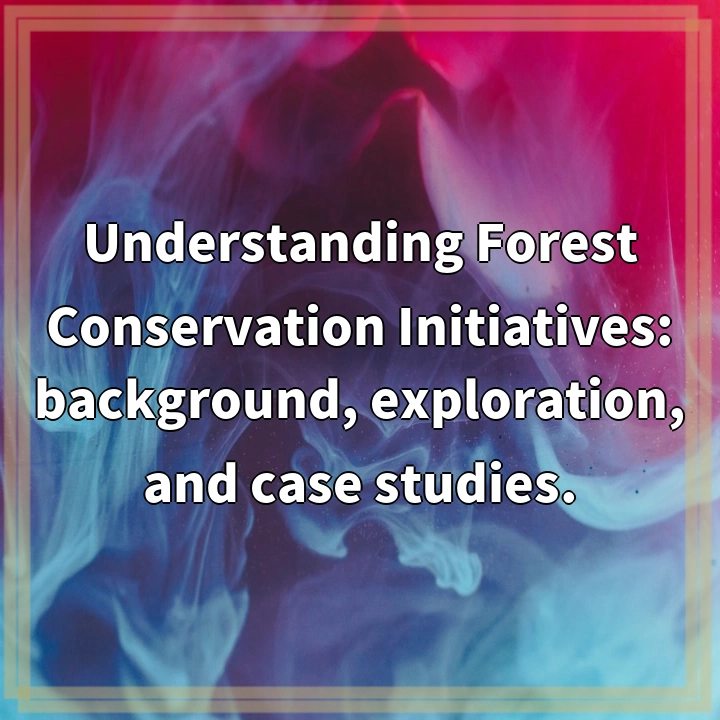
What are Forest Conservation Initiatives?
Forest conservation initiatives are proactive measures taken to protect and preserve the world’s forests. They involve a range of strategies, policies, and actions aimed at managing and sustaining forest ecosystems for the benefit of present and future generations.
Real-World Problems Associated with Forest Conservation Initiatives
1. Deforestation
Deforestation is one of the biggest challenges in forest conservation. It refers to the permanent loss of forests due to human activities such as logging, agriculture expansion, urbanization, and infrastructure development. Deforestation disrupts ecosystems, causes loss of biodiversity, and contributes to climate change.
2. Illegal Logging
Illegal logging poses a significant threat to forest conservation efforts. It refers to the theft, unauthorized harvesting, or trading of timber. It not only depletes forests but also undermines sustainable forest management practices and conservation laws. Illegal logging often goes hand in hand with corruption, organized crime, and human rights abuses.
3. Wildlife Poaching and Trafficking
Wildlife poaching and trafficking are detrimental to forest conservation, as they directly impact biodiversity. Many forests are home to rare and endangered species, and poaching for ivory, bushmeat, or exotic pets can lead to the extinction of valuable wildlife populations. The illicit trade in wildlife also fuels organized crime networks.
4. Forest Fragmentation
Forest fragmentation occurs when large, continuous forest areas are divided or degraded into smaller, isolated patches. This can result from road construction, agricultural encroachment, or urbanization. Fragmented forests face challenges in maintaining biodiversity, wildlife habitats, and overall ecosystem functionality.
5. Climate Change
Climate change is a critical issue that intersects with forest conservation. Forests play a crucial role in carbon sequestration, reducing greenhouse gas emissions, and regulating local climate patterns. However, climate change can lead to increased forest fires, droughts, and the spread of pests and diseases, further endangering forest ecosystems.
6. Lack of Awareness and Education
A lack of awareness and education among communities and stakeholders can hinder forest conservation efforts. Understanding the importance of forests, their role in biodiversity conservation, and sustainable forest management practices is crucial for fostering a sense of responsibility and taking proactive measures for conservation.
7. Conflicting Interests and Unsustainable Resource Extraction
Conflicting interests, often driven by economic factors, can thwart forest conservation initiatives. Unsustainable resource extraction, such as unregulated logging, mining, or agriculture, can lead to forest degradation and loss. Balancing the needs of local communities, industry, and conservation is a complex challenge that requires careful planning and cooperation.
8. Inadequate Governance and Enforcement
Inadequate governance and enforcement of conservation laws and policies pose significant obstacles to effective forest conservation. Weak law enforcement, corruption, and lack of financial resources can undermine efforts to combat deforestation, illegal logging, and wildlife trafficking. Strengthening governance frameworks and enforcement mechanisms is essential for successful forest conservation initiatives.
Overall, understanding and addressing these real-world problems associated with forest conservation initiatives are crucial for safeguarding our forests and ensuring their sustainable management for the benefit of current and future generations.

Solutions for Forest Conservation
Addressing the real-world problems associated with forest conservation requires multi-faceted solutions that involve various stakeholders and approaches. Here are some potential solutions:
1. Sustainable Forest Management
Implementing sustainable forest management practices can help maintain the health and integrity of forest ecosystems while allowing for responsible resource extraction. This involves establishing clear guidelines for timber harvesting, reforestation measures, and promoting selective logging techniques.
2. Strengthening Law Enforcement
Enhancing governance frameworks, investing in law enforcement capacity, and cracking down on illegal logging and wildlife trafficking are vital steps to protect forests. This includes improving surveillance, intelligence-sharing, and collaboration between authorities, conservation organizations, and local communities.
3. Promoting Community Engagement
Involving local communities in forest conservation initiatives fosters a sense of ownership and responsibility. Encouraging sustainable livelihood alternatives like eco-tourism, agroforestry, and community-based forest management can provide economic incentives for locals to protect and conserve forests.
4. Conservation Education and Awareness
Emphasizing the importance of forest conservation through education and awareness campaigns can help change attitudes and behaviors. Teaching communities, especially youth, about the interconnections between forests, biodiversity, climate change, and their own well-being can promote long-term conservation efforts.
5. Collaboration and Partnerships
Collaboration between governments, NGOs, local communities, and the private sector is essential for successful forest conservation. Building partnerships can leverage resources, expertise, and knowledge, leading to more effective conservation strategies and better enforcement of regulations.
6. Supporting Indigenous Rights
Recognizing and respecting the rights of indigenous communities who have traditionally protected and managed forests is essential for forest conservation. Supporting indigenous land rights and empowering indigenous peoples to participate in decision-making processes ensures their knowledge and practices contribute to sustainable forest management.
By implementing these solutions, we can strive towards effective forest conservation, protecting these vital ecosystems and the many benefits they provide for our planet and future generations.















